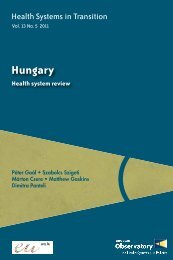Canada - World Health Organization Regional Office for Europe
Canada - World Health Organization Regional Office for Europe
Canada - World Health Organization Regional Office for Europe
You also want an ePaper? Increase the reach of your titles
YUMPU automatically turns print PDFs into web optimized ePapers that Google loves.
96<br />
<strong>Health</strong> systems in transition <strong>Canada</strong><br />
Table 4.10<br />
Educational and training requirements of 22 health occupations, 2009<br />
Occupation Minimum education required<br />
Internship or<br />
clinical practicum<br />
required<br />
Audiologist Master’s Yes Yes<br />
Chiropractor Professional doctorate Yes Yes<br />
Dental hygienist Diploma Yes Yes<br />
Dentist Professional doctorate Yes Yes<br />
Dietician Bachelor’s Yes Yes<br />
Environmental public health<br />
professional<br />
<strong>Health</strong> in<strong>for</strong>mation management<br />
professional<br />
Bachelor’s Yes Yes<br />
Diploma or Bachelor’s Yes Yes<br />
Licensed practical nurse Diploma Yes Yes<br />
Medical laboratory technologist Diploma Yes Yes<br />
Medical radiation technologist Diploma Yes Yes<br />
Midwife Bachelor’s Yes Yes<br />
Nurse practitioner Master’s or Post-Bachelor’s Certificate Yes Yes<br />
Occupational therapist Master’s Yes Yes<br />
Optometrist Professional doctorate Yes Yes<br />
Pharmacist Bachelor’s Yes Yes<br />
Physician Medical doctorate plus residency Yes Yes<br />
Physiotherapist Master’s Yes Yes<br />
Psychologist Doctorate Yes Yes<br />
RN Diploma or Bachelor’s Yes Yes<br />
Registered psychiatric nurse Diploma or Bachelor’s Yes Yes<br />
Respiratory therapist Diploma Yes Yes<br />
Speech–language pathologist Master’s Yes Yes<br />
Source: Compiled from CIHI (2011a).<br />
National<br />
examination<br />
(in addition to any<br />
P/T requirements)<br />
While undergraduate education and the awarding of undergraduate medical<br />
degrees (the basic “medical doctorate”) is the purview of the 17 medical schools<br />
in <strong>Canada</strong>, the RCPSC is responsible <strong>for</strong> overseeing the graduate education and<br />
training of physicians. As such, the RCPSC accredits 17 residency programmes,<br />
all run by the university-based medical schools. Specialists are also certified by<br />
the RCPSC, which is recognized by all province medical licensing authorities<br />
except <strong>for</strong> Quebec, where the Collège des médecins du Québec is the primary<br />
certifying body (Flegel, Hébert & MacDonald, 2008; Bates, Lovato & Buller-<br />
Taylor, 2008; CIHI, 2011a).<br />
Educational requirements <strong>for</strong> nurses have increased dramatically over the last<br />
two decades, with a major shift from two-year diploma programmes to four-year<br />
bachelor degree programmes. Nurse practitioners are RNs whose extra training<br />
and education entitles them to an “extended class” designation. Their scope
















